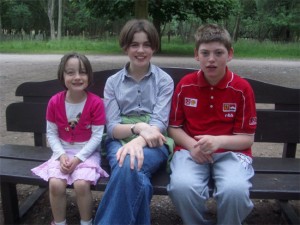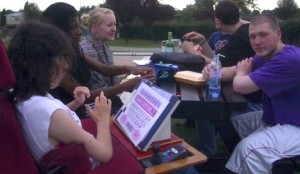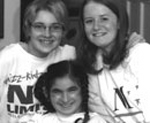A moment that made me think
I once said to a friend that if I found out I was pregnant with a baby who had severe disability, I would get an abortion. I was twelve at the time, and had an ambition to be a writer. That friend introduced me to Maresa MacKeith two years ago. I am now 14, and my opinion has changed radically! The following speech was written for my GCSE English coursework in 2009 and was delivered it to 120 Year 10 students. Afterwards, everybody was really interested, and they asked me lots of questions about Maresa. Now, I’m thinking about talking to my teachers to invite Maresa to come and speak at my school. Since meeting Maresa, I have been involved in the HobNob group she organises once a month, where I’ve met other young people my age who can’t talk.

A moment that made me think was when I received a text from my friend Maresa, telling me that she’d got a 2:1 in her English Literature degree. This might sound like a fairly normal thing to most of you- lots of people get degrees, after all. The first thing I thought when I received that text was what a great achievement it was. You see, Maresa has cerebral palsy and no speech. For those of you that don’t know, cerebral palsy is a condition that affects the part of your brain that controls your body. This means Maresa cannot control her body and cannot move on her own. I expect it seems like a bit more of an achievement now!
The next thing I thought when I received the text was one of incredulity. How had Maresa done it? She was in special education from 5 and was not allowed into ordinary classes until she was 14 (what this says about the education system I don’t know, but moving on swiftly…) At one point in her education, she was put in a predominantly glass room, completely isolated, and people just stared at her like she was an object. Over the years, it has been a constant battle for her and her mum Caroline to get her into a state school where she would be included and able to learn things. She didn’t even get into mainstream school until she was 14. In a way, I felt angry about the ignorance of everyone around her, and their incapability to just accept differences. Shockingly, many people didn’t even believe that Maresa could think properly, just because she couldn’t communicate in the same way. Of course, my incredulity was at the fact that Maresa didn’t just handle all of this, but overcame it with dignity.
I also thought about the physical struggle of it all. Even after Maresa had fought (and, in many ways, won) this battle to get an education, there was still the problem of actually doing the degree. Of course, Maresa didn’t see this as a problem; she overcame it like everything else. The way in which a single sentence is written starts with Caroline asking Maresa if she feels like writing. She picks up Maresa’s hand, and Maresa pulls inward for ‘yes’ and pushes away for ‘no’. Then, Caroline must pick up Maresa’s hand again, hold a QWERTY keyboard printed on paper in front of her, and Maresa taps out each letter. Caroline types it in, asks if it is right, and Maresa will say ‘yes’ or ‘no’. And that’s the process of typing a single sentence. I expect I’ve exhausted you just saying that. That is the process Maresa had to use for a 14,000 word dissertation.
What I finally thought was what an amazing woman Maresa is. The sheer emotional strength of handling all those years of isolation and exclusion didn’t stop her. The fact she had to laboriously type everything out with one hand didn’t stop her. Not even pneumonia, with which she became gravely ill and was hospitalised in the final year of her degree, could stop her! If I had to name a role model in my life, it would be Maresa who I look up to most. It makes all of my complaints about a lot of homework seem silly. She is an incredible person, and truly someone I look up to, especially with all the adversity she has overcome.
Emma Scriver, 14




